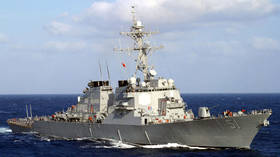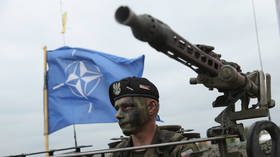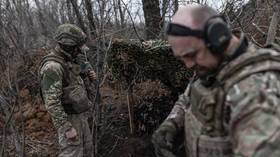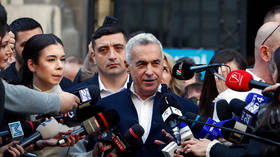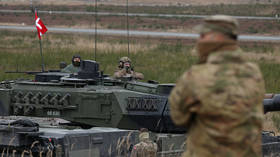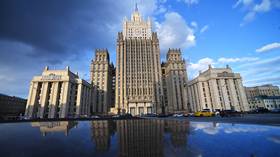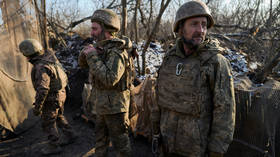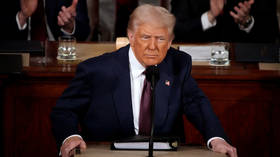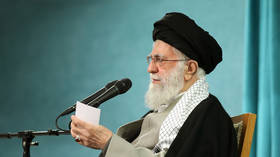Europe’s ‘Cuban Missile Crisis’
Russian President Vladimir Putin has demanded guarantees from NATO that the US-led military bloc won’t expand further eastwards. Washington, however, has predictably ruled this out as a non-starter.
While Moscow sees more NATO members on its borders as an existential threat and a deliberate provocation, much of the West rallies behind the principle that countries have a “sovereign right” to join whichever factions and groupings they please. For many analysts, this is the fundamental principle of European security.
But Russia insists European security depends on limiting the expansion of military alliances and mitigating the oppositional format of the European security architecture. This dispute is at the heart of the standoff over Ukraine.
These competing views on the fundamental principle of European security are the result of a changing balance of power.
The bipolar era of the Cold War
The fundamental principle of a benign security architecture is that states should not enhance their security to the extent that it diminishes the security of others. This is based on one of the central concepts in international relations, the ‘security dilemma’, which recognises that if state A enhances its security at the expense of state B, then state B must respond in a manner that eventually undermines the security of state A. During the bipolar era of the Cold War, this was considered an uncontroversial reality and the point of departure for initiatives to ease tensions.
When Cuba exercised its sovereign right to engage in a military partnership with the Soviet Union, the US did not champion the principle of sovereign right to choose military partnerships. On the contrary, the US demonstrated it was prepared to start a nuclear war in 1962 to prevent Cuba from exercising its sovereign right to host Soviet missiles.
Any effort to establish a stable and peaceful European security order, from the Helsinki Accords in 1975 to the Charter of Paris for a New Europe in 1990, focused on the concept of the ‘indivisibility of security’, which is the principle of providing equal security to all nations. In a Europe consisting of rival military blocs, enhancing the security between East and West demanded the mitigation of the zero-sum relationship between the two military blocs.
Reducing the zero-sum format of European security to mitigate the security dilemma was the winning strategy that ended the Cold War in 1989, but, in 1991, the Soviet Union collapsed and the principle of European security changed fundamentally.
The sovereign right to join military blocs
The Warsaw Pact was dismantled and the Soviet Union dissolved, which made NATO the only military bloc in Europe. By rejecting an inclusive European security architecture, Washington was able to monopolise security, as states could either have guarantees within the US-led military alliance or be left with uncertainty outside the tent.
With NATO being the only game in town, former truths about security were denounced. The fundamental principle of European security is now that states must have the sovereign right to choose membership in military blocs. In other words, they have the right to be in the bloc, no matter what anyone else thinks.
Peace derives from compromise and the constraining of rival military blocs, but NATO has rebranded itself as a liberal democratic institution and thus a ‘force for good’. No longer does peace depend on compromise and constraints, but rather on the compromising of values, and the acceptance of limitation on expansionism is deemed tantamount to appeasement. Any Russian concern about zero-sum bloc politics is dismissed as “paranoia”, a “zero-sum mentality”, and a “Cold War mentality”. Russian opposition to NATO expansionism is viewed simply as a rejection of democratic values and an indication of Russia’s expansionist intentions.
We are told that NATO is a liberal democratic institution that poses no threat to anyone, does not do zero-sum politics and cannot have spheres of influence. The term ‘sphere of influence’ used to infer ‘exclusive influence’ achieved by incorporating a state into a military bloc. NATO has now turned the meaning of this word on its head, as ‘sphere of influence’ is now used to mean Russia limiting the sovereign right of its neighbours to join the bloc.
George Orwell brilliantly summed up how propaganda turns language on its head to make dissent impossible: “War is peace, freedom is slavery and ignorance is strength”. In the age of NATO hegemony, invasion is humanitarian intervention, coup is democratic revolution, subversion is democracy promotion, gunboat diplomacy is freedom of navigation, torture is enhanced interrogation techniques, sphere of influence is a ring of well-governed states, expansion of military blocs is European integration, dominance is negotiating from a position of strength, purging the media and political opposition in Ukraine is defending democracy against Russian hybrid war, and Russia’s demands for guarantees against NATO expansionism are an assault on democracy and sovereignty.
The entire principle of the sovereign right to join military blocs is premised on the bloc being the sole option. Both the EU and NATO refuse to cooperate with the Russian-led Collective Security Treaty Organization for fear it may be perceived as legitimate. Similarly, Hillary Clinton announced that Washington was determined to “slow down or prevent” the development of the Eurasian Economic Union. The argument of sovereign choice is insincere if NATO is the only legitimate option.
The new balance of power
More powerful states will naturally embrace principles that remove constraints. Now the era of unipolarity is over and the world is transitioning to multipolarity, will the West accept a return to seeking peace by constraining military blocs? It seems fair to assume the term ‘sovereign right’ to join military alliances would disappear from the American vocabulary if Russia returned its nuclear missiles to Cuba or China developed a military alliance with states in Central America.
Putin and US President Joe Biden will speak on Tuesday, at a time when stakes are high. It may be the last chance to avert a modern-day European Cuban Missile Crisis.
The statements, views and opinions expressed in this column are solely those of the author and do not necessarily represent those of RT.
The statements, views and opinions expressed in this column are solely those of the author and do not necessarily represent those of RT.
